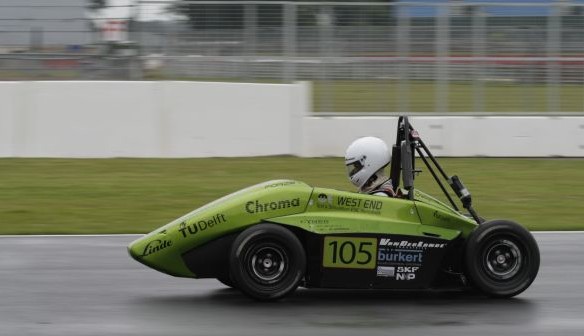Hydrogen Race Car Takes On Fossil-fueled Rivals
July 17, 2012
on
on

For the first time a hydrogen race car entered the annual Formula Student competition held in the UK. Built by the Forze hydrogen racing team of the Dutch Delft University of Technology, the Forze V race car is equipped with a hydrogen fuel cell which powers two electric motors.
The Formula Student (FS) challenge invites teams from universities across the world to build a car and race them against each other at the Silverstone race circuit. FS started in 1998 and aims to inspire young engineers to go through the full cycle of building a single-seat racing car, including business plan, design, presentation and -of course- building and competing.
In 2008 Class 1A was introduced, a special category apart from Class 1, dedicated to low carbon emission cars.
However, the Forze V team decided to race their car- which only exhaust is pure water- against its Class 1 gas-guzzling brethren. They came in 29th of 103 contestants.
Alistair Wardrope, a judge of the FS races said that the Forze V ‘beat many gasoline powered race cars on a level playing field. Internal combustion engines have been developed for over a hundred years. The significance of the achievement lies in Delft Forzes’ skill in adopting a new technology to compete against a well developed technology.’
The car weighs 280kg (617lbs) and is powered by a 18kW hydrogen fuel cell. Its top speed is 120km/h (75mph) and accelerates from 0 to 96km/h (0-60mph) in less than 5 seconds. On a full tank of 600 grams of gaseous hydrogen the car can race for an hour. Its only exhaust product: three liters of water (0.8 gal).
The Delft Force V team hopes their car will convince people that fuel cells are the long term solution for sustainable mobility.
Via: Formulazero.tudelft.nl
The Formula Student (FS) challenge invites teams from universities across the world to build a car and race them against each other at the Silverstone race circuit. FS started in 1998 and aims to inspire young engineers to go through the full cycle of building a single-seat racing car, including business plan, design, presentation and -of course- building and competing.
In 2008 Class 1A was introduced, a special category apart from Class 1, dedicated to low carbon emission cars.
However, the Forze V team decided to race their car- which only exhaust is pure water- against its Class 1 gas-guzzling brethren. They came in 29th of 103 contestants.
Alistair Wardrope, a judge of the FS races said that the Forze V ‘beat many gasoline powered race cars on a level playing field. Internal combustion engines have been developed for over a hundred years. The significance of the achievement lies in Delft Forzes’ skill in adopting a new technology to compete against a well developed technology.’
The car weighs 280kg (617lbs) and is powered by a 18kW hydrogen fuel cell. Its top speed is 120km/h (75mph) and accelerates from 0 to 96km/h (0-60mph) in less than 5 seconds. On a full tank of 600 grams of gaseous hydrogen the car can race for an hour. Its only exhaust product: three liters of water (0.8 gal).
The Delft Force V team hopes their car will convince people that fuel cells are the long term solution for sustainable mobility.
Via: Formulazero.tudelft.nl
Read full article
Hide full article



Discussion (0 comments)